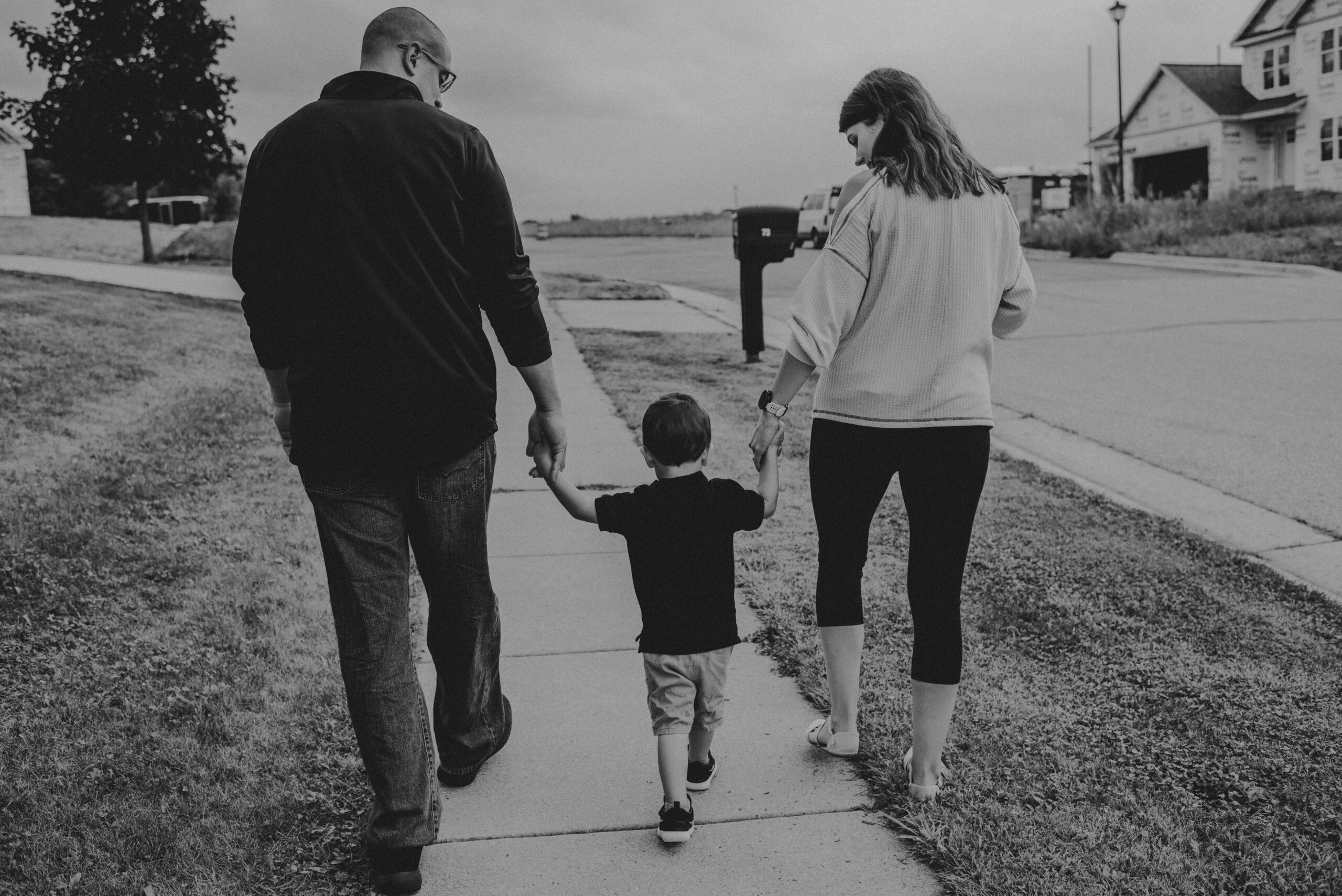Postpartum Depression vs. Postpartum Anxiety: What’s the Difference?
August 13, 2024
Motherhood is a profound and transformative experience, bringing immense joy and challenges alike. While it’s common to hear about postpartum depression (PPD), there’s significantly less awareness around postpartum anxiety (PPA) and other manifestations of mental anguish such as OCD. In my opinion (as someone who not only has wrestled with OCD and anxiety myself, but has also been helping others for over 15 years), understanding the differences between these conditions and recognizing their symptoms is so important for new moms.
Today, I want to dive into what PPD and PPA are, how they differ, and what you need to know to move through it!

Recognizing the Symptoms of Postpartum Depression and Postpartum Anxiety
Let’s start by breaking down the differences between the two.
Postpartum Depression (PPD): PPD is often characterized by feelings of intense sadness, hopelessness, and fatigue that interfere with a mother’s ability to care for her baby and herself. Symptoms can include:
- Persistent sadness or low mood
- Loss of interest in activities previously enjoyed
- Fatigue and lack of energy
- Difficulty bonding with the baby
- Changes in appetite or sleep patterns
- Thoughts of harming oneself or the baby
Postpartum Anxiety (PPA): PPA, on the other hand, involves overwhelming worry and fear that can be paralyzing. It’s more than just being a concerned new mom—it’s excessive and intrusive. Symptoms can include:
- Constant worry about the baby’s health and safety
- Racing thoughts and an inability to relax
- Physical symptoms like dizziness, nausea, and palpitations
- Irritability and restlessness
- Avoidance of certain activities due to fear
- Sleep disturbances, even when the baby is sleeping
Postpartum OCD: While less talked about, which doesn’t mean that it’s less common, we have postpartum OCD. It involves obsessive, intrusive thoughts and compulsive behaviors aimed at reducing anxiety. Symptoms can include:
- Intrusive thoughts about harm coming to the baby
- Compulsive behaviors (e.g., excessive cleaning, checking)
- Fear of being alone with the baby
- Avoidance of certain objects or situations
As someone who has experienced OCD as a new mom, I can tell you firsthand that I wouldn’t wish it on my worst enemy. That’s one of the reasons why I’ve made it my life’s work to educate and increase awareness around it (because it’s way more common than you think!).
Why It’s Important to Normalize Postpartum Depression, Postpartum Anxiety, and Postpartum OCD
We often hear about postpartum depression in the context of new motherhood, but postpartum anxiety and OCD are also significant challenges that many moms face. Normalizing both PPD and PPA means acknowledging that they are common, treatable conditions and that it’s okay to ask for help.
Understanding how common PPD, PPA, and postpartum OCD are can help normalize these experiences and encourage mothers to seek help without shame. Studies show that postpartum depression affects about 1 in 5 of new mothers, making it a significant concern for many women after childbirth. Postpartum anxiety, while less frequently discussed, is also prevalent, impacting approximately 15-20% of new moms . While some studies show that postpartum OCD is less common, the truth is that its symptoms often go unrecognized and untreated due to a lack of awareness. You can read more about how mom anxiety symptoms might be masking OCD here.
These statistics show that these conditions are far from rare, and acknowledging their prevalence is crucial in reducing stigma and fostering a supportive environment for mothers facing these challenges so that more women feel comfortable seeking help. Recognizing that you are not alone in your struggles is the first step toward getting the support you need.
The Overlap and Differences Between PPD and PPA
While postpartum depression and postpartum anxiety are distinct conditions, they can often overlap or coexist. Some mothers may experience symptoms of both, making it more even important to understand the nuances of each condition.
Key Differences:
- Emotional State: PPD is primarily characterized by persistent sadness and hopelessness, while PPA is dominated by excessive worry and fear.
- Energy Levels: Women with PPD often experience fatigue and lack of motivation, whereas those with PPA may feel restless and unable to relax.
- Thought Patterns: PPD tends to involve negative self-thoughts and feelings of worthlessness, while PPA manifests as constant worrying about potential dangers or “what-ifs.”
- Relationship with the Baby: PPD can lead to difficulty bonding with the baby, while PPA might result in overprotectiveness and constant concern for the baby’s well-being.
- Sleep Patterns: Both conditions can affect sleep, but women with PPD may oversleep or have trouble getting out of bed, while those with PPA might have difficulty falling asleep due to racing thoughts.
Despite these differences, both PPD and PPA can significantly impact a mother’s quality of life and her ability to care for herself and her baby. Both conditions can also lead to:
- Feelings of guilt or shame
- Difficulty concentrating
- Changes in appetite
- Physical symptoms like headaches or stomachaches
- Isolation from friends and family
Risk Factors for Postpartum Depression and Postpartum Anxiety
Like I’ve said over and over again, these symptoms and conditions are incredibly common. Understanding the risk factors for PPD and PPA can help expectant mothers and their support systems be more prepared and vigilant. Some common risk factors include:
- Personal or family history of mental health issues: A history of depression, anxiety, or other mental health conditions increases the risk of developing postpartum mood disorders.
- Hormonal changes: The rapid drop in hormones after childbirth can contribute to mood disturbances.
- Lack of social support: Feeling isolated or unsupported during pregnancy and early motherhood can exacerbate symptoms.
- Stressful life events: Major life changes, financial stress, or relationship problems can increase vulnerability to PPD and PPA.
- Difficult pregnancy or childbirth experience: Complications during pregnancy or a traumatic birth experience may contribute to the development of these conditions.
- Sleep deprivation: The lack of sleep that often accompanies caring for a newborn can worsen symptoms of both PPD and PPA.
- Unrealistic expectations: Societal pressure to be the “perfect mother” can lead to feelings of inadequacy and anxiety.
Remember that this list is not conclusive. You may not feel like any of this applies to you and yet still may find yourself suffering from Postpartum Depression or Anxiety and you deserve to get help.
A Masterclass For Moms With Anxiety
If you’re a mom struggling with postpartum OCD and anxiety, my nearly 3-hour masterclass, “Handling Scary Thoughts in Motherhood,” is the most comprehensive guide available. This masterclass is specifically tailored to moms, offering in-depth insights and support for managing these challenging symptoms. I dive deep into strategies and practical tips from start to finish, making it an invaluable resource for mothers. I’d love to support you as well!

Understanding Postpartum Depression and Postpartum Anxiety
Postpartum depression and postpartum anxiety are common challenges that many new mothers face. By understanding the differences between these conditions, recognizing their symptoms, and knowing when and how to seek help, we can create a more supportive environment for new moms.
Remember, experiencing PPD or PPA doesn’t make you a bad mother. These are treatable conditions, and with the right support and interventions, you can overcome them and enjoy the journey of motherhood. If you’re struggling, don’t hesitate to reach out for help. You’re not alone, and there is support available to help you through this challenging time.
By fostering open conversations about postpartum mental health, we can break down stigma, encourage early intervention, and ensure that every mother has the support she needs to thrive in her new role. Let’s continue to support, educate, and empower one another on this incredible journey of motherhood.
most popular episodes
Love my podcast?
Episode 112: Postpartum OCD and False Memory OCD
Imagine how in depth I can go in an online course. Instantly downloadable and game-changing. Take the next step towards an amazing life.